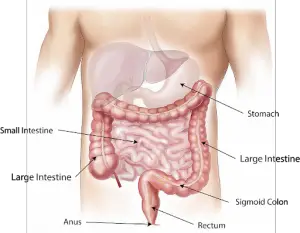People don’t pay a lot of attention to their gut, even though the saying goes listen to your gut. But what about gut health? Since what you eat affects your gut health, people often ask: is a plant-based diet good for gut health?

Researchers studying gut microbiome have found plant-based diets such as a vegan diet to promote gut health. In comparison, meat and dairy products were found to be less healthy for the gut.
Good gut health is a surefire way to avoid other, more serious health issues. Also, it results in a healthier and active lifestyle. Stomach pains can be horrible and negatively affect the quality of life. According to a survey, as many as 74% of Americans have digestive problems, which is a big time-bomb in terms of health.
What is Gut Microbiome?
Gut health basically refers to the gut microbiome. To understand the importance of gut health, it’s important to know what microbiome is.
The gut microbiome is the name for microorganisms living in our digestive tract that help with digestion. This microbiome exists in our stomach, small intestine, and large intestine. In addition to metabolism, it also has a role in boosting immunity and producing certain hormones.

In a healthy gut, the microbiome is well-balanced. There are over 39 trillion bacteria collectively in the digestive tract. In terms of species of bacteria, there are nearly 500 different species.
The gut microbiome is an ecosystem within the body where microorganisms thrive. Your lifestyle influences the environment of this ecosystem. A healthy diet thrives on it, whereas an unhealthy diet makes it lose its precarious balance.
How Does Gut Health Affect the Body?
Until recent times, the digestive system was seen as a simple system whose job it was to digest food, absorb nutrients, and result in bowel movement. However, a lot of studies have shown that the gut has more to do with the overall health of the body.
The gut is linked with many other systems, and a bad gut can have a domino effect. Here’s how your gut affects various systems and parts of the body:
Digestive Diseases
The very first thing it affects is the very thing it’s responsible for. The digestive system can develop a number of diseases, including Irritable Bowel Syndrome (IBS), Crohn’s disease, and Colitis.
Most of these diseases are a result of inflammation in parts of the digestive tract. It can result in bad stomach pains, diarrhea, and eventually cause other more serious problems.
Risk of Diabetes
Your blood sugar levels can rise because of your gut. Your gut may produce acetate, which is a fatty acid when you eat a lot of processed foods. This fatty acid is capable of increasing insulin response, eventually increasing the risk of diabetes and obesity.
The main reason behind this is that this acid triggers your brain to eat more, which in turn, increases the insulin levels in your body. As a result, your blood sugar level rises, and you gain weight.
Mood
Research out of Harvard Medical School noted that what you eat also influences your mood. Their study concluded that processed foods might have a negative impact on mental health.
This is because 90% of serotonin receptors are in your gut. This chemical is related to a good mood, as it’s often called the happy chemical. Apparently, ultra-processed foods can mess up these receptors causing your good mood to go away.
Cancer
A 2013 study found that the gut microbiome was linked with cancer. In this study, they found that fatty foods resulted in a secondary bile fluid that can cause liver cancer. You probably didn’t think that the flora in your stomach could be linked to cancer, but as the research suggests, it may have a strong connection.
Lower Immunity
Did you know that the gut microbiome makes up 75% of your body’s immune system? Yes, these bacteria are responsible for fighting infections as well. An imbalance can lead to leaky gut syndrome, which can reduce your immunity against a variety of diseases and conditions, including cancer, IBS, obesity, chronic fatigue, and even depression.
Signs of an Unhealthy Gut
You might not realize that your gut is unhealthy before it does the damage. So it’s important to know and to look out for signs of an unhealthy gut:
Stomach Problems
Stomach problems like bloating, gas, diarrhea, and constipation can be a sign of poor gut health. A healthy gut will lead to regular bowel movement and no stomach issues, in comparison. If you constantly face one of these issues, you should discuss it with a doctor.

Unintentional Weight Changes
If you gain or lose weight without any exercise or diet change, it could be the result of an unbalanced microbiome. It directly affects how your body absorbs nutrients, so if it doesn’t fully absorb the nutrients, you may lose weight. Similarly, it may affect your insulin resistance, causing weight gain.
Poor Sleep
Poor sleep patterns and insomnia can be a result of an unhealthy gut. Serotonin, which affects your mood, also affects your sleep. If the microbiome messes with the serotonin levels in the body, you could experience sleep problems.
Some people also feel chronic fatigue in addition to sleep deprivation, or generally poor quality sleep. All these signs are interconnected to what you’re eating essentially.
Food Intolerance
If you’ve developed certain food intolerance all of a sudden, it could be because of the bacteria in your stomach refusing to process those foods. While food allergies can be genetic, there’s some evidence that poor gut health can also be responsible.
Inflammation
Inflammatory diseases, like arthritis, are auto-immune diseases. Since the gut is directly linked with the immune system, there’s reason to believe that it can cause auto-immune diseases, or at least raise the risk. One study from the National Institute of Health has linked the gut microbiome to rheumatoid arthritis.
Is a Plant-based Diet Good for Gut Health?
A plant-based diet has the right mix of nutrients that promote a healthy microbiome. Those who eat plenty of plant-based foods will have a healthy gut. Even those who have gut-related problems can use a plant-based diet to get their gut health back to normal.

A sixteen-week study conducted by researchers at the Physicians Committee for Responsible Medicine has found a vegan diet to boost gut microbiome. This study was presented in Barcelona, Spain, in 2019.
Researchers found that a vegan diet helped improve gut health by improving blood sugar control and maintaining body composition. Those are two effects we already know plants have on our bodies. It’s also notable that the researchers indicated that it does not have to be strictly a vegan diet, as even a simple plant-based diet can do the job at improving gut conditions.
Another reason why a plant-based diet is good for gut health is that it prevents inflammation. Inflammation in the digestive tracts occurs mainly because of bad bacteria. The bad bacteria increases when the balance is off.
According to NutritionFacts.org, the main substance that guards our digestive system against inflammation is butyrate. This substance essentially suppresses inflammation in the gut, and it comes from fiber. Plant-based diets, as you know, are inherently rich in fiber.
Dr. Michael Greger also explains why and how butyrate acts the way it does. Processed foods have the opposite effect of fiber and butyrate. Such foods increase the chances or severity of inflammation in the gut.
Does a Plant-based Diet Help with IBS?
Irritable Bowel Syndrome or IBS is a disorder of the large intestine that leads to abdominal pain, bloating, gas, diarrhea, and constipation. The symptoms are not always severe and can be managed simply through a diet.
Changes of bacteria in the gut can cause IBS. Other causes include infections, muscle contraction, and inflammation. IBS is a pretty common condition that may be managed by a plant-based diet.
Not all plant-based diets may be good for IBS and may take time to reduce the symptoms. Generally, high-fiber diets with little to no carbs are a good option. So when following a plant-based diet, go for whole foods rather than processed ones, even if they are vegan.
You should also avoid garlic, onions, artichokes, and some stone fruits, as they are not helpful with suppressing IBS symptoms.
People who take antacid and other medications for treating IBS symptoms have gotten off them simply by following a whole-food plant-based diet.
Can a Plant-based Diet Help with Crohn’s Disease?
Crohn’s disease is an inflammatory bowel disease that can occur almost anywhere in the digestive tract. Because of the inflammation, the patient can get abdominal pain, diarrhea, fatigue, and lose weight.
Crohn’s disease is a serious disease that can cause debilitating pain and get worse over time. In certain cases, it can even lead to life-threatening conditions. Its causes are still being studied, but it’s believed to be hereditary.
A plant-based diet can help with Crohn’s disease, suppress it’s symptoms, and may even cure it for good. We recently saw a study where a participant sent the disease into remission after being on a plant-based diet for six months.
This study is just another addition to the growing evidence of plant-based foods curing, or at least managing the severe symptoms of this disease.
Usually, people require surgery for treating Crohn’s disease as the inflammation goes deep into the layers of the digestive tract.
Again, as the study shows, only a whole-food plant-based diet has what it takes to treat it. You’ll have to be off processed foods and meat completely.
Can a Plant-based Diet Help with Colitis?
Colitis or ulcerative colitis is a chronic condition resulting from the inflammation of the inner lining of the colon. It’s another inflammatory bowel disease The symptoms include diarrhea, abdominal pain, rectal pain, rectal bleeding (in bowels), fever, weight loss, and fatigue. These symptoms get worse over time, especially with bad choices in diet and lifestyle.
A paper from Translational Pediatrics recommends a plant-based diet for treating inflammatory bowel diseases like Colitis. In this paper, they studied patients of all ages and different levels of colitis. With a plant-based diet, the patients showed signs of remission.
It’s clear that the anti-inflammatory effect of plant-based foods reduces the inflammation in the innermost layer of the colon. The fiber and antioxidants nurture the gut microbiome, which, in turn, promotes better gut health.
According to the paper, it’s possible to treat mild colitis only by changes in the diets without the need for medication.
Plant-based Foods for Gut Health
Is a plant-based diet good for gut health? Now you know the answer. But even in the plant-based category, there’s a huge range of foods. The main question is which foods should you be focusing on for improving gut health?

High Fiber
Fiber is great for your gut, and it’s so readily available in so many plant-based foods. You should eat more dietary fiber in the form of cereal grains and fruits. A study from Frontiers Nutrition specifically pointed at high fiber intake of vegetarian and vegan diets for promoting healthy and
Some high fiber foods include:
- Oats
- Legumes
- Beans
- Broccoli
- Pumpkin
- Avocado
- Apple
- Orange
- Blackberries
- Raspberries
- Guava
Plant-based Probiotic Foods
You don’t necessarily have to resort to probiotic supplements to treat gut disorders or generally improve gut health. Some plant-based foods can do the job of probiotics. These foods include:
- Miso
- Kimchi
- Tempeh
- Sauerkraut
Wrap Up
Your gut health is extremely important, especially considering the current pandemic. As it’s directly linked to your immune system, it’s crucial that you maintain a healthy balance of microbiome in your digestive system.
Even if you suffer from a gut-related disease, it’s never too late to make the change and manage your symptoms. It may take some time but you’ll see a noticeable difference in your gut and feel your symptoms gradually going into remission.
So is a plant-based diet good for gut health? The answer is a resounding yes!
You may also like: ARE PLANT-BASED DIETS HEALTHY? >>CLICK HERE!










